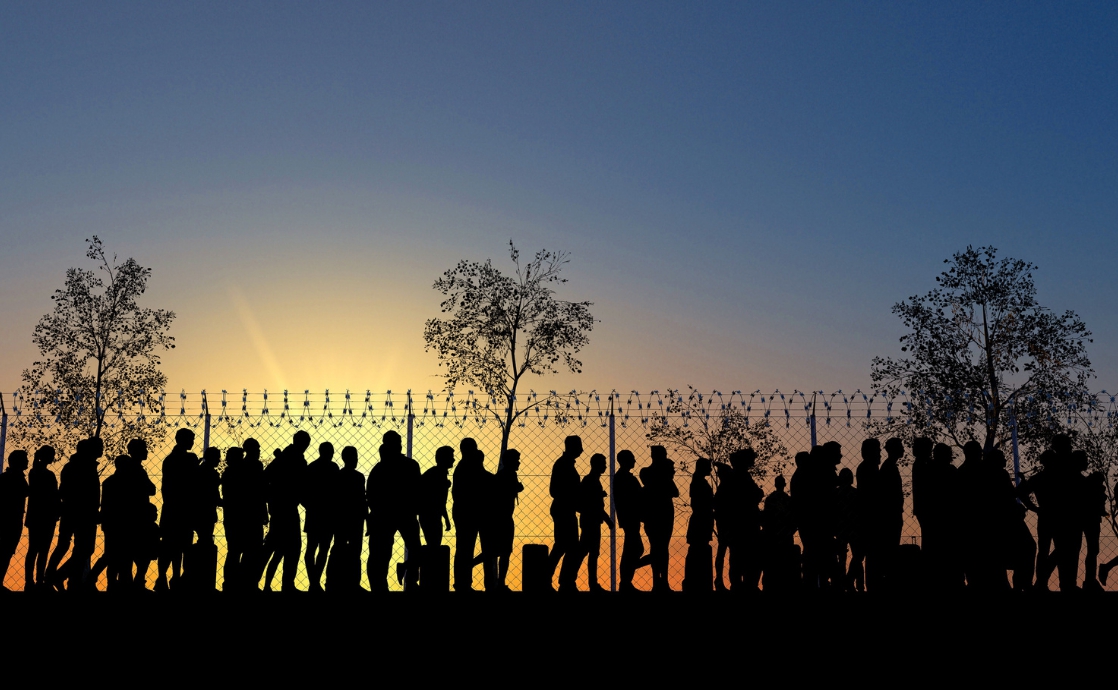The views expressed in our content reflect individual perspectives and do not represent the authoritative views of the Baha'i Faith.
Baha’is understandably have a deep concern for those who wander without a home, since Baha’u’llah, the prophet and founder of the Baha’i Faith, became a refugee himself for much of his life:
… Baha’u’llah … upraised this standard of the oneness of humanity in prison. When subjected to banishment by two kings, while a refugee from enemies of all nations and during the days of His long imprisonment He wrote to the kings and rulers of the world in words of wonderful eloquence, arraigning them severely and summoning them to the divine standard of unity and justice. He exhorted them to peace and international agreement, making it incumbent upon them to establish a board of international arbitration …
Abdu’l-Baha, Baha’u’llah’s son and successor, wrote those words. He also challenged every human being to help “every victim of oppression:”
Summon ye, then, the people to God, and invite humanity to follow the example of the Company on high. Be ye loving fathers to the orphan, and a refuge to the helpless, and a treasury for the poor, and a cure for the ailing. Be ye the helpers of every victim of oppression, the patrons of the disadvantaged.
Today, the world overflows with those victims of oppression, fleeing for their lives from injustice, hunger, war, and death, and crying out for help.
RELATED: The Way to Welcome Immigrants and Strangers
Refugees and Migrants: Homeless and Stateless
The United Nations High Commission on Refugees (UNHCR) says the world has never experienced larger numbers of forcibly displaced people: by the end of 2020, a total of 82.4 million, or 1 of 95 human beings, more than one per cent of humanity, became refugees.
In fact, human displacement – which numbered one in 159 people only a decade ago – continues to rise consistently, year over year.
Try to imagine it – these beleaguered people, driven from their homelands by persecution, violence, war, hunger, and human rights violations, have become homeless refugees. Both the Covid-19 pandemic and climate change have had an impact on the increasing numbers of displaced people, and the rising tide continues to surge. In real terms, this displacement now amounts to almost 50,000 people forced to flee their homes every day, because of conflict, persecution, or famine. More than half of them are children.
That number does not include the millions of so-called “economic migrants,” people who voluntarily leave their home villages, cities or countries seeking a better life.
This monumental global crisis challenges all of us. Such a huge forced migration imperils the stability of entire countries, political systems, and the global community itself. Unfortunately, in the absence of any coordinated international response, many countries have responded by closing their borders and enacting draconian policies to keep out migrants and refugees. This puts extreme pressure on the relatively few countries who either volunteer or are forced to accept refugees and migrants.
Experts say that we haven’t seen the end of it, either. Multiple scientific reports predict a rising rate of refugees fleeing from mounting climate change, as sea level rise, drought, and hotter temperatures cause crop yields to fall or fail, forcing people from their land.
Some leaders have begun to speak out about this expanding crisis — but the world, as yet, has not come up with any reasonable, workable, or comprehensive solutions. International relief organizations like the United Nations and large NGOs have been overwhelmed by the growing enormity of the problem. “The world’s system for protecting refugees,” Amnesty International has concluded, “is broken.”

Searching for Solutions
In search of solutions, we can first turn to the generally-accepted principles of the Universal Declaration of Human Rights, which state:
Article 13.
(1) Everyone has the right to freedom of movement and residence within the borders of each state.
(2) Everyone has the right to leave any country, including his own, and to return to his country.
Article 14.
(1) Everyone has the right to seek and to enjoy in other countries asylum from persecution.
According to these accepted principles of international law, governments have a solemn legal duty to help all fleeing refugees and asylum seekers — but most of the world’s nations fail to follow those laws, still treating refugees and asylum seekers as someone else’s problem.
By closing their borders, refusing to grant asylum, and building physical and economic barriers, those countries’ policies have forced an incredible 86% of the world’s refugees — mostly from Middle Eastern, African and South Asian nations — to stay in adjacent countries in those developing regions, where few governments and organizations have the resources to help them.
As a result, just four countries now host the majority of the world’s refugees: Turkey, Pakistan, Uganda, and Lebanon. Only one nation among the world’s ten largest refugee destinations belongs to the wealthy, developed Western countries: Germany. Ironically, in a shift of major proportions the country that once created a refugee crisis during the Holocaust has now become the most refugee-friendly nation in Europe.
The world’s growing refugee and migration crisis has recently risen, as a political and social issue, to a frantic, polarizing boil in many economically-developed parts of the Western world.
In the United States, Canada, all across Western and Eastern Europe, and in Australia, refugee- and immigrant-related matters have generated enormous political controversy and upended conventional ways of thinking and governing. Observers have variously labelled this trend as nationalism, nativism, protectionism, isolationism, racism or simple fear-mongering. Emotional arguments and ugly fights have erupted over the topic, and will likely continue, since no single nation seems to have the solution. The “great replacement” theory has pushed the issue into new territory, as well, falsely claiming that immigration will cause “White genocide” by replacing native-born Europeans with other cultural, religious, and ethnic groups.
RELATED: When Immigrants Move In: It’s All About Service
A Solution to Humanity’s Refugee and Immigration Crisis
The Baha’i teachings offer humanity the solution – a democratically-elected global system of governance empowered and able to make the worldwide policy decisions necessary to deal with supra-national issues and problems like migration and refugees. The Guardian of the Baha’i Faith, Shoghi Effendi, summarized that system of governance in his book The World Order of Baha’u’llah:
Some form of a world super-state must needs be evolved, in whose favor all the nations of the world will have willingly ceded every claim to make war, certain rights to impose taxation and all rights to maintain armaments, except for purposes of maintaining internal order within their respective dominions. Such a state will have to include within its orbit an international executive adequate to enforce supreme and unchallengeable authority on every recalcitrant member of the commonwealth; a world parliament whose members shall be elected by the people in their respective countries and whose election shall be confirmed by their respective governments; and a supreme tribunal whose judgment will have a binding effect even in such cases where the parties concerned did not voluntarily agree to submit their case to its consideration. A world community in which all economic barriers will have been permanently demolished and the interdependence of Capital and Labor definitely recognized; in which the clamor of religious fanaticism and strife will have been forever stilled; in which the flame of racial animosity will have been finally extinguished; in which a single code of international law – the product of the considered judgment of the world’s federated representatives – shall have as its sanction the instant and coercive intervention of the combined forces of the federated units; and finally a world community in which the fury of a capricious and militant nationalism will have been transmuted into an abiding consciousness of world citizenship – such indeed, appears, in its broadest outline, the Order anticipated by Baha’u’llah, an Order that shall come to be regarded as the fairest fruit of a slowly maturing age.
In the next essay in this series, we’ll examine how the world’s major religions, including the Baha’i Faith, ask us to respond to this critical issue.
















Comments
Sign in or create an account
Continue with Googleor